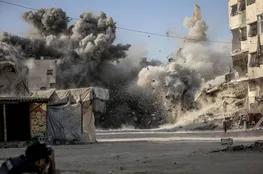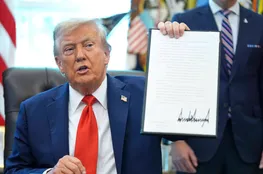Iran's recent shipment of hundreds of short-range ballistic missiles to Russia solidifies the notion that U.S. adversaries perceive the Biden-Harris administration as weak. The Wall Street Journal reported that these missile exports are in addition to thousands of drones from Iran and missiles from North Korea, bolstering Moscow's capability to strike civilian areas in Ukraine. Despite repeated U.S. and European threats, Iran's actions have continued unabated.
The Biden-Harris administration's reluctance to permit Kyiv to use Western-supplied weapons against Russian airfields or other strategic targets reflects a broader hesitance to confront adversaries. This pattern extends to other geopolitical contexts as well. President Biden's ineffective warnings to Vladimir Putin before the invasion of Ukraine and Vice President Kamala Harris's hollow admonishments against illegal immigration from Central America underscore a broader ineffectiveness. Harris's reluctance to engage with U.S. media in a substantive press conference brings into question her capacity to stand up to formidable international foes.
Should she ascend to the presidency, her choice of advisers is likely to perpetuate the existing administration's perceived weakness. Her record as a California liberal suggests she may even opt for more dovish counselors. The administration's handling of Iran exemplifies this cautious approach. Concerned that pressing Tehran too hard might exacerbate tensions in the Middle East, Biden-Harris have refrained from strict measures. This hesitation is partly influenced by a belief that Iran's new president, Masoud Pezeshkian, viewed as a moderate, should not be undermined before achieving meaningful reform—despite historical evidence suggesting otherwise.
Furthermore, Tehran's strategy of using proxies to harass Israel without provoking direct retaliation undermines the idea that Iran fears regional escalation. Speculation from sources like The New York Times suggests that President Biden's perceived 'lame-duck' status may impede decisive action, potentially due to his focus on other political challenges. From day one, Biden's national security measures—such as border policies, the Afghanistan withdrawal, and reversing Trump's sanctions on Iran—have signaled a shift towards a more lenient stance. This approach started under President Obama, who ramped up engagement with Tehran before the controversial nuclear accord.
Trump's cancellation of that deal had significant economic impacts on Iran, but Biden's administration has resumed a more conciliatory tone. Vice President Harris's lack of substantive foreign policy experience, apart from ceremonial appearances, suggests she would likely continue this diplomatic playbook without significant deviation. Her prospective vice-presidential pick, Tim Walz, who opted out of National Guard deployment to a war zone, further emphasizes a potentially non-confrontational approach. Therefore, voters seeking robust leadership to counteract America's adversaries and strengthen its global standing may find little assurance in a Harris-Walz ticket.
























